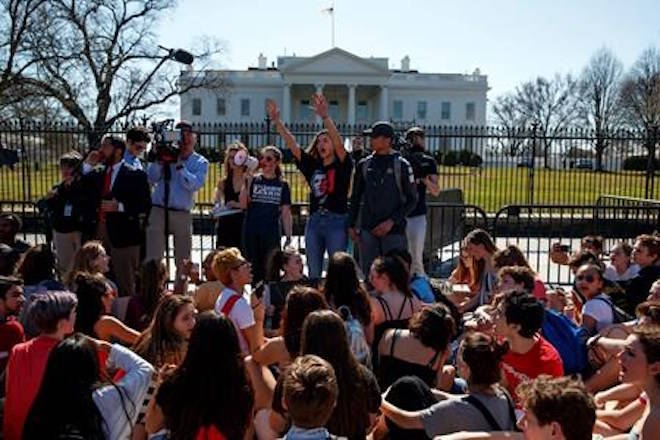A snapshot of America’s gun debate unfolded outside the White House on Wednesday, on the fringes of a youth-led march where teenaged demonstrators drew cheers from adult bystanders and horn-blasts of support from motorists.
Nijier Coates felt like an outlier.
The 16-year-old high school student favours gun rights, he’s been shooting for years, has a dad in the military, a mom in federal security and he made clear why he was attending this gun-control march: “I’m just here with my friends.”
It was one of several protests across the country, as schools in Maryland and Virginia saw students — outraged over last week’s massacre of 17 students and teachers at a Florida high school — spill out to voice their impatience with generations of politicians who have resisted taking meaningful action on gun control.
The marches got support from parents, teachers, and school principals. In some cases, the approval was tacit: “Our principal was like, ‘Because I’m the principal I can’t really say you should walk out. But I’m not gonna stop you,’” said one Maryland teen, 16-year-old Jennifer Rodriguez.
So they took the metro to Capitol Hill and marched to the White House, chanting, “We have a voice. We have a voice” and, “No more violence! No more silence!” and, “Hey-hey, ho-ho, the NRA has got to go.”
But Coates finds some of this unfair — blaming the National Rifle Association, or guns for that matter.
“I’m an NRA member. My family is,” he said.
“To ban all those guns — I don’t know what to say…. In a DUI, we blame the (drunk) driver. In a bombing, we blame the bomber. But in a mass shooting, we blame the gun. It makes no sense to me, and it makes no sense to other people. Why do we blame an object?… People kill people. Guns don’t kill people.”
Related: Students head to Florida capital to press for gun law change
Yet he shares much common ground with his friends.
Expanded background checks; a ban on purchases for people with mental disabilities; wait times — he supports them all. Coates also wants limits on clip sizes: “There’s no reason for a civilian to have a 60-round magazine that goes into an AR-15.”
It turns out other kids share those objectives. Few have any illusions their country is on the cusp of a broader gun ban.
“I know that’s not really going to happen,” said Kylee Sebens, 15.
“At least (have) a little bit stricter rules.”
That, in a nutshell, is America’s gun-control debate.
Limited reforms have near-unanimous support. This week, a Quinnipiac University poll showed 83 per cent approval for a mandatory federal wait time to buy a weapon and 97 per cent support for expanded background checks, significantly higher than the 67 per cent support for a ban on so-called assault weapons.
So why the failure to get anything done?
One author ascribes it to political tribalism. In a country split into mutually loathing camps, she says the paramount priority is not to find solutions but to pound away at the other: city-dweller versus country-dweller, Democrat versus Republican, upper class versus lower class, and gun-owner versus gun-hater.
“People from one tribe see others not just as the political opposition, but as immoral, evil and un-American,” Yale professor Amy Chua, author of, “Political Tribes: Group Instinct and the Fate of Nations,” wrote in the New York Times.
Those tribal cleavages appeared Wednesday.
Conspiracy-theory peddlers smeared the student protesters as actors, or political plants and their videos skyrocketed to popularity on social media. One such video even got a Twitter “like” from the American president’s son, Donald Trump Jr.
Inside the White House, the president tried bringing disparate groups together. Some favoured gun control, some less so. One thing they had in common was a connection to school shootings — as survivors or family members of victims.
Trump promised to explore three actions: expanded background checks, mental-health screening, and age limits on gun purchases.
“We will get there,” Trump said.
The president appeared to float the idea of arming teachers — an idea opposed by many in the room; they clapped when one man suggested arming staff would create more problems than it solves.
A Trump-supporting father, grieving the loss of his daughter in last week’s Florida massacre, shouted that it’s time to secure schools — instead of debating peripheral issues like firearms.
“We should have fixed it (already),” Andrew Pollack said of school safety.
“And I’m pissed.”
Related: A 6-minute fatal rampage for shocked Florida school
A teenage survivor tearfully insisted guns are the core issue.
Meanwhile, on the sidewalk outside the White House, Sebens described the effects of school shootings on her generation. She said she has a group chat set up on her phone so she can immediately connect with her entire family in the event of massacre.
“You can’t really feel safe — in or out of school now,” she said. “We’re having lockdown drills. But we don’t think it’s going to help. Florida (had those drills) it and it didn’t help at all…
“I hope that this time will make a difference.”
Alexander Panetta, The Canadian Press



